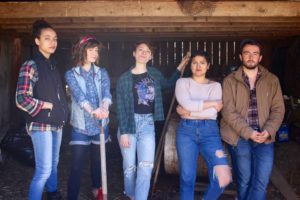
Review by James Wilkinson
‘Heritage Hill Naturals’ – Written by Francisca Da Silveira. Directed by Phaedra Michelle Scott. Dramaturg: Sarah Schnebly. Assistant Director: G Cadogan. Scenic Design: Abby Shenker. Lighting Design: Emily Bearce. Costume Design: Stephanie K. Brownell. Prop Design: Cesara Walters. Sound Design: Lee Schuna. Presented by Fresh Ink Theatre at the Boston Center for the Arts, Deane Hall, Calderwood Pavilion, 527 Tremont St., Boston, through May 26, 2018
A millennial is an odd creature, or at least that’s what we’re told. I happen to be one (born in 1988, which puts me in the middle of the pack), but the way the generation is described in media, I sometimes get the feeling that we’re seen as a separate species rather than an age group. We’re growing up, though, and like the Boomers, the Yuppies, and the Gen Xer’s before us, we’re encountering a world with a very specific set of problems. And like those other generations, the artists among us will start to tell stories of what it was like to come of age at the time we did. Fresh Ink Theatre’s new show, Heritage Hill Naturals by Francisca Da Silveira, now playing at the Boston Center for the Arts, could be seen as one such entry into that canon, though it may first need a little more work.
Our protagonist is Lucy (Alex Casillas), a recent college graduate in present day America who is feeling lost and may have some mental health issues. To remedy the situation, she has volunteered to work for one month at an organic farm in the middle in rural Georgia. There she meets a menagerie of people who have all come to the farm for different reasons. Some, like Lucy, are volunteers, while others are paid employees. It’s clear though that everyone at the farm is invested in it and feels some form of ownership or connection to the location. At first, Lucy goes through a kind of fish-out-of-water culture shock as she adjusts to the much more eco-hippie vibe of the farm exhibited by fellow volunteer Erica (Laura Baronet Chowenhill), the politically radical Sasha (Emily Elmore), free-spirited Robin (Kellie Moon) and devout man of God, Ethan (Jon Vellante). There are no locks on the doors, everyone eats kale and the only connection to the mysterious owner of the farm is manager, Rose (Aislinn Brophy). At first it seems that this collection of characters have come together to form a kind of makeshift family, but a more sinister underbelly is eventually exposed. Robin and Ethan are living together and their relationship, which at first seems merely quirky, takes a more menacing turn as Ethan’s dominating and controlling behavior becomes more and more apparent. When Lucy intervenes and tries to get Ethan kicked out of the farm, he refuses to go and turns his threatening behavior toward Lucy.
Playwright Da Silveira sets up a couple of intriguing mysteries to keep the audience interested: What has happened in Lucy’s past that has affected her mental health? What exactly are the intentions of Carl, the owner of the farm who is never seen but is shown to be capable of pulling a number of influential strings behind the scenes? I was always interested in what was happening on stage, but I have to confess that I struggled to figure out exactly what the takeaway of the show was supposed to be. At certain points, it seems that the play wants to examine forms of privilege along class and race lines within this hippie liberal-leaning community.
For example, upon learning in that Lucy was born in Africa, Erica proceeds to make a number of microaggression assumptions that are played for comedic effect. It’s pointed out by Ethan that while he’s working on the farm because it’s his job and he needs the work, Lucy and Erica are well off enough that they can take a month to ‘find themselves’ while volunteering. The trouble is that it doesn’t feel as though these ideas are really intergrated or build towards anything. Late in the play, Rose mentions that originally, the farm used to be a slave plantation, but the reveal feels tossed in rather than a part of a conversation. At other points in the play it seems that the focus is supposed to be Lucy’s personal growth as she works through her mental health issues. Both the advertising for the show and the final image of the piece play up this idea, but we never get a clear picture as to what those issues are or what it is she’s learned. One powerful scene in the play has Lucy working through a panic attack after being threatened by Ethan. It’s clear that she’s working through something. But what? I kept wishing that the play would go deeper into the ideas that it’s setting up.
This isn’t to say that there aren’t high points in the production. The cast is excellent. Alex Casillas gives a great central performance as Lucy. I often found myself chuckling at the warmth and humor Laura Baronet Chowenhill and Emily Elmore bring to their characters. Jon Vellante is appropriately menacing as his character is shown to be more than a bit unhinged. Abby Shenker’s set design is wonderfully earthy and when combined with Emily Bearce’s lighting, creates some beautiful images. Director Phaedra Michelle Scott’s in-the-round staging gives the play an immersive and naturalistic quality that serves it well. The moments of humor that occur before the play takes a darker turn are allowed to bubble up organically. There are pleasures to be had and moments of joy to be found, I’m just not sure that it leads anywhere. For tickets and more information, visit their website at: www.freshinktheatre.org

